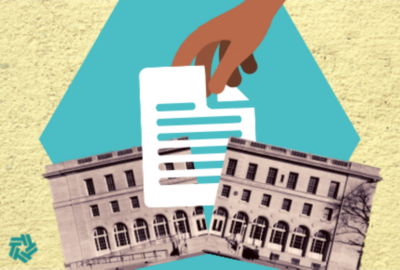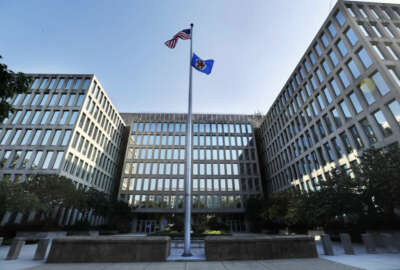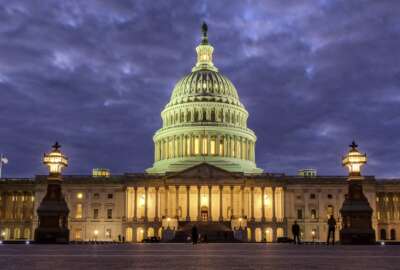This bill would extend TSA’s authority to many more passenger flights
"The flying public needs to be safe. The pilots deserve to be safe. The flight attendants deserve to be safe," New York Congressman Nick Langworthy said.
There’s a loophole in air transportation security: chartered public flights that sell seats in advance, but don’t have the passenger screening that scheduled airlines do. A bill in Congress would change that. It’s sponsored by New York Congressman Nick Langworthy, who joined the Federal Drive with Tom Temin to discuss more.
Interview transcript:
Tom Temin There’s a loophole in air transportation security. Chartered public flights that sell seats in advance but don’t have the passenger screening that scheduled airlines do. A bill in Congress would change that. It’s sponsored by New York Congressman Nick Langworthy, who joins me now. Congressman Langworthy, good to have you with us.
Nick Langworthy Thank you for having me on, Tom.
Tom Temin What is the problem here? Because one of the big selling points of these charter services is you just walk right onto the plane.
Nick Langworthy Well, I think that’s exactly the problem. And we have we took the opportunity of 9/11 and the 23rd anniversary to announce this bill joining by, you know, my co-chair of the Aviation Safety Caucus, Jack Bergman, and Congressman D’Esposito from Long Island. And the Aviation Safety Caucus has co-sponsored this bill because we have a problem with the, you know, part 135 and part 380 operators. These these charter airlines that want to offer you hop on, hop off service without the inconvenience of TSA. This is a loophole that’s just completely unacceptable. And in a time where we have such international angst and conflict, you know, we we clearly have an immigration problem. And we’re finding people on the terrorist watch list in our country. They’re going to find loopholes like this, just like they figured out how to get on those airplanes 23 years ago and take over the plane. This can’t happen anymore and Congress needs to act to plug these holes because no one should be exploiting loopholes in a system for profit that can make our skies less safe. The flying public needs to be safe. The pilots deserve to be safe. The flight attendants deserve to be safe. And the idea that you’re going to market individual tickets on a scheduled plane and avoid TSA, just, it can’t happen in this country.
Tom Temin Does this include those operators that are like fractional jet types of things or sometimes they sell extra seats on those? Would those be included?
Nick Langworthy This is carriers like JSX and Contour Airlines and others. They use a combination of those two part 135 and part 380 designations to actually operate schedule flights to ticketed passengers with publicly available schedules, out of facilities that often don’t have the same levels of passenger screening as are required for, you know, other scheduled commercial air service. I mean, this isn’t when someone has a Netjets, that’s their private, you know, ability to rent the whole plane. This is you’re going to rent one seat on a regularly scheduled flight. I mean, it’s really no different than, you know, a commercial flight, but it’s avoiding the entire system. And how do we know that this isn’t going to get infiltrated by someone that, you know, seeks to do harm? It They need to be screened just like everybody else. And this is exactly the aim of the Safer Skies Act, is to plug these loopholes and build a wall in front of them.
Tom Temin And so what would the act specifically do here? What would it require of, say, TSA?
Nick Langworthy Well, it would, you know, under the current law, part 135 operators are authorized by the FAA to provide commercial non-scheduled aircraft operations for compensation or hire in part 380 operators or public charter operators who arranged charter flights by contracting with a direct air carrier to charter an aircraft and then resell the tickets to the public. The, you know, what we have, you know, is an operator, operators, with these that have two different designations. JSX is a part 380 and deluxe public charter is a part 135. They’re all rolled into one to create an operation that’s effectively a scheduled commercial carrier with all the convenience of a public charter. This is never what was intended by those designations, and it certainly poses a security risk to passengers and crew, and it would eliminate their ability to have that kind of designation, and it would implement TSA screening requirements to make them work, just like other airlines. If there were scheduled seats on, you know, individual seats on the scheduled regularly scheduled aircraft, I mean, that has to be treated just like every other commercial carrier.
Tom Temin We’re speaking with Nick Langworthy, congressman who represents New York’s 23rd district. And yes, I’m looking at the JSX route system. It’s a national airways. I mean, they, it looks like a small airline. It’s got a lot of destinations and you can go from Westchester County all the way to Oakland, California, if you want. So, yeah, I see what you’re saying. TSA then would, do you envision having checkpoints at the terminals and some of them are out of the way where these airlines operate, similar to the maybe reduced version of what they would have at the mainline airports?
Nick Langworthy Well, this business model is creating a back door, you know, around passenger, you know, screening and safety. I mean, the the current methodology, to my understanding, is nothing more than the security that you’d go through to go through, you know, maybe the Smithsonian, and that is not the intention in the post-9/11 world. We have to have our guard up. There are people out there that seek to do this country harm. We have, you know, 9/11 was just the worst day in the country’s history. And we can’t afford another one of these. And these are probably smaller planes, but a lot of damage can be done, you know, to life, to property, to, you know, infrastructure and to the psyche of the country if there is a disaster due to terrorism on one of these aircraft. So, you know, this would this bill would eliminate this loophole. It would make them go through TSA and, you know, perhaps change your business model. Because I just I think this is very objectionable the way this is going on. And they need to play by the rules like everybody else. No one should be able to sell the ability on an individual ticket basis to avoid having to go through TSA.
Tom Temin Yeah, you would think those operators would want that kind of screening because some of them do operate, you know, 30, 40 passenger jets. It’s not like their little puddle jumpers. Do you envision?
Nick Langworthy It’s not like renting a private aircraft where, you know, the people on there with you, these are, you know, you put 40 strangers on an airplane and you don’t know who you’re getting.
Tom Temin But do you envision TSA having to establish new checkpoints and having the personnel to man them? Or would do you envision this operationally as people having to go through a regular terminal and then out to those planes?
Nick Langworthy I think that it really depends on the budget of these airlines and how they want to function going forward in the facilities that they’re at. I mean, as you said, there’s many different facilities that this one particular carrier goes into. And I think it’s got to be evaluated in a case by case basis. But I think they should be put through TSA just like everybody else. And if they’re functioning at facilities that don’t have TSA, they have to have some level of comparable screening. And this is part of the burden of doing business. So they’re going to have to be at the table if they want to do business in this fashion. They need to be treated like all the other commercial carriers because what they’re doing is not charter. It’s commercial.
Tom Temin Right. And would you envision that the Transportation Department would have to undertake rulemaking through part 135, part 380 of the enabling legislation for this type of carrier? Would there be rulemaking required?
Nick Langworthy I would, I would expect that you’d have to have some new rulemaking following this legislation for sure.
Tom Temin And what are the chances? I mean, at this point, Congress has got a pretty full plate between now and the end of the short season left.
Nick Langworthy This is certainly something they can get attached to another legislation. It’s something we’re going to be working towards. And it’s the goal of this brand new aviation safety caucus. I mean, this, this comes after the FAA reauthorization. I mean, my district had the last commercial aviation disaster in the country, Flight 3407 in, in Clarence, New York, back in 2009. And that was back when I was a congressional staffer. And the families of that, that crash, their, their survivors, you know, went on to change airline safety standards. And myself, and several like-minded legislators, you know, fought by their side to preserve what they had achieved back in 2010 with the 1,500 in, in cockpit, you know, flight hours requirement for all pilots that was not the case before that accident, and they went on to get this standard to make that universal across the commercial sphere. And that was under assault by the chairman of the Transportation Committee. And we put a bipartisan coalition together to amend that FAA reauthorization to preserve that standard. That’s where the Aviation Safety Caucus was born, with that coalition of legislators trying to put together a group of like minded people in between FAA reauthorizations to be there as a clearinghouse for flight safety and aviation safety for our flying public, for our pilots, and for all the hardworking people that, that keep those planes in the air.
Tom Temin Republican Congressman Nick Langworthy represents New York’s 23rd district. Thanks so much for joining me.
Nick Langworthy Thank you very much, Tom.
Tom Temin And we’ll post this interview along with a link to the TSA bill at federalnewsnetwork.com/federaldrive. Subscribe to the Federal Drive wherever you get your podcasts.
Copyright © 2024 Federal News Network. All rights reserved. This website is not intended for users located within the European Economic Area.
Tom Temin is host of the Federal Drive and has been providing insight on federal technology and management issues for more than 30 years.
Follow @tteminWFED






